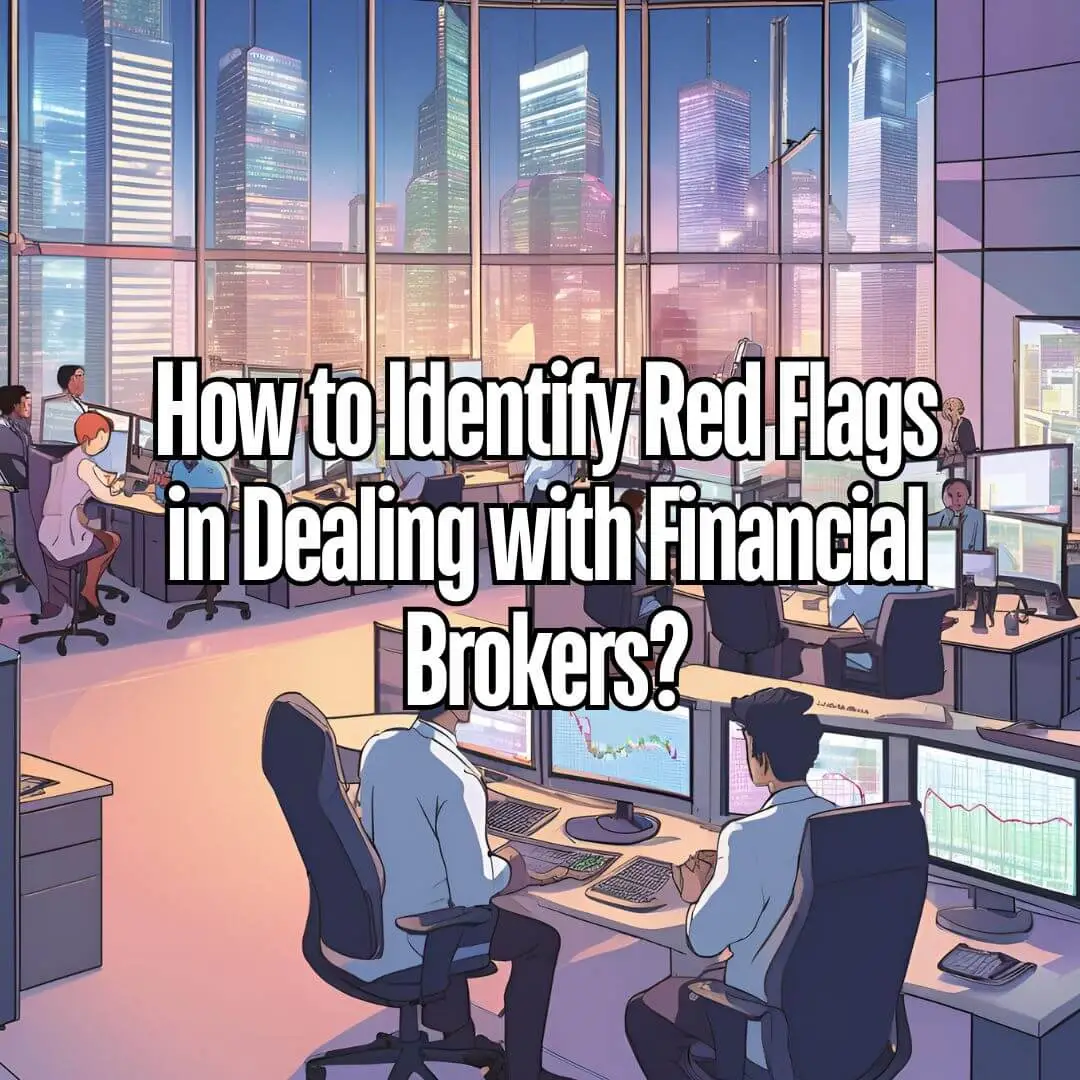
How to Identify Red Flags in Dealing with Financial Brokers?
When dealing with a financial broker, one is best advised to be alert and proactive in taking securities for investment. While financial brokers may bring valuable advice and means of access to markets, not all brokers operate with openness or integrity. Some may practice high-risk dealings, while the worst may commit outright fraud. The ability to identify red flags in good time can help you protect your assets and have peace of mind when it comes to the management of your finances. In cases where persons have been victimized by misleading practices, a team like that found at radlygroup.com 一 professional lawyers with a specialty in financial protection 一 can be consulted for recovery means, methods of retrieving funds, and taking legal action against unscrupulous brokers.
This article is an all-covering guide for the warning signs that raise suspicion over the integrity of any financial broker. The detection of these warning signs acts as a catalyst to make proper decisions and avoid certain financial fallacies.
The Relevance of Choosing a Trustworthy Broker
A financial broker is an agent who assists his clients in dealing with trading and asset management. A good broker opens access to the financial markets, gives good counsel, and helps a client make informed choices. On the other hand, dealing with an intransparent broker, or one that will not act in your best interest, can have disastrous financial consequences. So many fraud and asset mismanagement cases start with the failure of clients to check and verify the credibility of brokers whom they so blindly trust. This is why it is important to know what to watch out for.
Why Knowing Red Flags Matters?
The financial world is complex, and a churning broker can take undue advantage of it to fleece the client. Being warned about the red flags of the broker’s behavior and practices will save you from potential losses and emotional stress. If ever you suspect dishonest behavior, write professionals like Radly Group for the first step in resolving issues and reclaiming funds.
Red Flags to Watch Out for in Financial Brokers
Below are a few critical warning signs that may hint that a financial broker is unreliable, or something even worse.
1. Lack of Transparency
It is expected that any good broker will not lack transparency. A good broker will have open talks with his client on his commission, services offered, investment strategies to be employed, and any possible risks that may come up with whatever recommendations he might propose to the client. If a broker is not open with his commission structure or doesn’t answer questions concerning how your money will be handled, this could be a serious warning sign.
Common Signs of Lack of Transparency
- Unclear or hidden fees
- Vague descriptions of investment strategies
- Limited or no access to your account information
- Refusal to provide detailed performance reports
If you find that you’re having trouble getting straight answers, it’s a good idea to re-think your association with that particular broker. Transparency breeds trust, and if you feel like your broker isn’t transparent, then they can’t be looking out for you either.
2. High-Pressure Tactics
A good financial broker will give you advice and let you make your decisions about investment without pressure. If a broker has repeatedly urged you to make speedy decisions, forces you to invest more money, or promises you unrealistically high returns, then that is an unethical broker right there. Most of the high-pressure tactics are used to drive clients to decisions that benefit the broker rather than the client.
High-Pressure Tactics Warning Signs
- Frequent calls or emails urging immediate action
- Attempts to convince you that an opportunity will expire soon
- Dismissal of your concerns or questions
- Promising guaranteed returns or low-risk, high-reward investments
It’s important to remember that every investment involves some level of risk, and no broker can promise that returns will materialize. If they make such boasts, most likely their concern is the commission on their sale rather than your investment success.
3. Lack of Proper Licensing or Registration
In most countries, brokers must register and obtain a license in order to offer services. If a broker seems hesitant to provide proof of a license or is only registered with questionable agencies, then it is the main red flag. Licensed brokers are subject to strict regulatory standards, which protect clients from any problems. Unlicensed brokerages may not operate under the same security umbrella.
How to Check a Broker’s License
- Ask for the broker’s license number and check the license number with state and federal regulatory agencies.
- Investigate the broker’s firm to ensure the company is registered with reputable regulatory organizations.
- Search for disciplinary actions or violations credited to the broker for past practices.
Professional legal support, such as from Radly Group, can help identify the legitimacy of a broker’s credentials if you suspect fraudulent practices.
4. Promises of High Returns with Minimal Risk
It’s every cliche that with higher returns, there is the accompaniment of higher risks. However, some lying brokers may tempt your clients with high returns but explain the risks inadequately. If some broker offers you an investment opportunity that is too good to be true, now is the time to get cautious. Reliable brokers will be straightforward about risks and not overstate their promises regarding the outcome.
Common Phrases That Indicate Unrealistic Promises
- “This investment is a guaranteed win.”
- “There’s little to no risk involved.”
- “You’ll double your money in no time.”
Investing inherently carries with it a degree of uncertainty, and anyone who can guarantee such an outcome with that degree of certainty is less than forthcoming. An understanding of the involved risk is vital to sane decision-making; thus, it should be a red flag if the broker dodges discussing any downsides.
5. Unusual Trading Activity in Your Account
Another red flag you should look out for is suspicious trading activity in your account. Some brokerage firms practice “churning,” the buying and selling of securities that are not in the customer’s best interest but serve to generate commissions for the broker. This increases the cost to the customer without adding any value to the customer’s portfolio. You have to regularly monitor your account and query unusual volumes of trading.
Unusual Activity to Spot
- Excessive trades without attractive returns
- Excessive buying and selling of securities without any apparent strategy
- Higher commissions are not in your interest to invest
If you’re unsure whether the activity in your account is beneficial, Radly Group’s team of financial lawyers can help investigate and determine if any fraudulent actions are taking place.
6. Poor Communication and Lack of Accessibility
A good broker has open communication with his or her clients. If you have a hard time getting in contact with your broker, or if he or she is unavailable to answer all of your questions, that can raise a red flag. Consistent, straightforward communication must be the first order in developing trust. If a broker becomes unreachable at any point, especially in a falling market, it may indicate that they are not committed or, worse still, trying to avoid responsibility.
What to Expect from Good Communication
- Regular updates on your investments
- Clear explanations of strategies and performance
- Prompt responses to inquiries
Reliable brokers will always ensure that you’re informed and will prioritize your understanding and comfort.
7. Negative Reputation or History of Complaints
Background checks on a broker may be the best way to rate any broker’s integrity. Online reviews, regulatory filings, and industry associations will show the history of complaints filed against them or any allegations of misconduct. A long history of customer complaints, unresolved disputes, or prior penalties are the best reasons to avoid using such brokers.
Steps to Check a Broker’s Reputation
- Read online reviews and look for patterns in client feedback.
- Check regulatory websites for any formal complaints or penalties.
- Reach out to former clients if possible, to learn about their experiences.
Professional legal services, such as those offered by Radly Group further facilitate this process by researching a broker’s background to assist you in making a well-rounded decision.
How to Choose a Reliable Financial Broker?
Now that you have an idea about what to watch out for, here are some helpful suggestions that will further enable you to choose a reliable broker.
- Do Your Research: Spend some time learning about a number of brokers; compare them to other broker services and customer reviews.
- Verify Credentials: A broker should be licensed and registered with reputable regulatory bodies.
- Ask Specific Questions: If certain investments are to be suggested, talk over the fees and strategies involved, and the risks.
- Monitor Account Activity: Go over all account statements with due care and ask questions about any activities unknown to you or suspicious.
Conclusion
While financial brokers provide considerable facilities for the client to consider, elaborate, and arrive at multifarious investment decisions, one should also be vehemently cautious with them. Knowing the common warning signals that a broker is not trustworthy will help in safeguarding one’s investments and enable sound decision-making.
If you feel that some dealings could be unethical or fraudulent, seeking out a professional firm like the Radly Group will be of immense help. Their law team has been actively involved in supporting people who feel they have been conned and misrepresented by their broker and ensuring that such deals come to a well-guided solution in retrieving one’s money and bringing a dishonest broker to book. More information about Radly Group and how it can further help you with keeping your money safe is at www.radlygroup.com.
After all, it may only take awareness, vigilance, and being proactive for you to protect your financial future. Whether one is an investor at the beginning stages or a seasoned investor who has survived many seasons, there should always be transparency and clarity in communication and comfort in the financial partnership.






